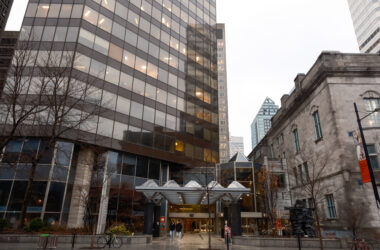On Sept. 18 Canadian news outlets began to report on a dispute between settler fishermen and members of the Sipekne’katik First Nation in southwest Nova Scotia. Settlers have destroyed property and physically intimidated members of the Sipekne’katik First Nation over their right to fish lobster. The settlers’ disregard of Indigenous treaty rights is one of many acts of colonial violence against Indigenous Peoples that have been reported in recent months.
On Feb. 20, the Students’ Society of McGill University (SSMU) released a statement in opposition to the Canadian government’s oppression of Indigenous Peoples, though McGill’s administration has remained silent. McGill’s inaction inspired Cody Martin, U2 Social Work, to author a call to action urging McGill’s School of Social Work to condemn the inhumane treatment of First Nations people across Canada.
“I thought about this [call to action] over and over [and] how I would approach [it],” Martin said. “It came down to telling the faculty, […] ‘it’s time to practice what you preach,’ [ in social work], we learn about the core of ethics, competency laws, the different historical relations with social work, and how [social workers are] supposed to be advocates at the political front.”
In his letter sent to the McGill School of Social Work’s Equity Diversity Decolonization Indigenization Initiative (EDDII), Martin recommended the adoption of several actionable items into the EDDII’s upcoming 2020-2024 strategic plan, which will be presented for a vote at the Oct. 28 School Council session. These recommendations include the release of a public statement in support of Sipekne’katik First Nation rights, the development of an anti-discrimination code of conduct for McGill’s School of Social Work, and the integration of 94 calls to action established by the Truth and Reconciliation Committee into the EDDII’s plan. Martin hopes that the implementation of these initiatives will foster a more equitable environment for McGill’s Indigenous students.
“I want to see McGill start honouring their words of action,” Martin said. “They talk about creating space […] for the Indigenous population and people of colour, they talk about creating all these spaces [carrying out] justice, but, at the end of the day, where are these spaces? Out of the 40,000 enrolled students at McGill, there’s a population of [only about 150 self identifying] Indigenous students.”
Introduced in the spring of 2020, the EDDII replaced the Equity Committee, a 2016 initiative that was created following a university-wide survey about equity on campus. While the committee was intended to help foster equity at McGill, it faced structural challenges when implementing change.
“Some of the objectives developed out of the equity survey were achieved, such as [the formation of] a collective space from which to launch activism around equity, diversity, and inclusion (EDI) issues,” the EDDII wrote in a collective statement to The McGill Tribune. “However, the committee structure proved a barrier to collective action.”
The implementation of the new EDDII initiative prompted an overhaul of the former Equity Committee. For the past six months, members of the McGill community have been consulted on how equity principles can have a greater impact at McGill.
“The results of this [consultation] process are [the creation of the] EDDII,” the collective wrote. “[The EDDII] is a […] collaborative structure to support and track the implementation of [an] actionable strategic four-year plan to achieve the integration [of] the principles of equity, diversity, decolonization, and Indigenization throughout our school.”
With the recent controversy surrounding James McGill’s colonial history and McGill’s billion-dollar debt to the Six-Nations community, Catie Galbraith, U3 Geography student and Vice President of Events for the Indigenous Students Alliance, feels that McGill can do more than releasing a public statement.
“McGill should absolutely be taking a stance against colonial violence, [but McGill] needs to go beyond just issuing statements,” Galbraith said. “It should take the form of financial reparations and support to communities and working to address their own colonial legacy.”
Renee Corbiere, U3 Arts, is an Indigenous student who feels that McGill can do more to further knowledge on Indigenous issues at the university.
“There’s not so much the school can do to completely remove racism from the country, but what they can do is ensure that their students are educated on [Indigenous issues].”









